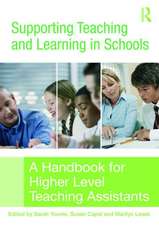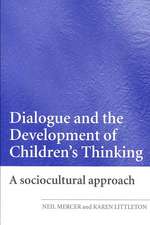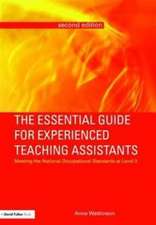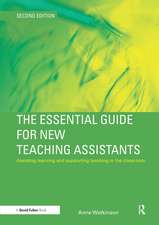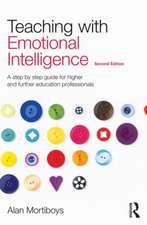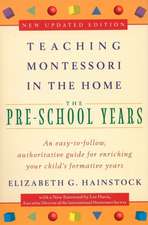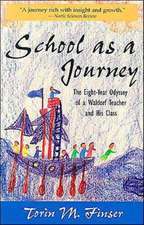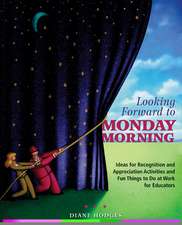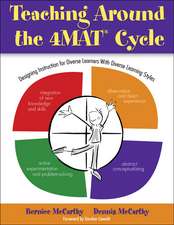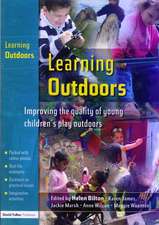Leading and Managing Teaching Assistants: A Practical Guide for School Leaders, Managers, Teachers and Higher-Level Teaching Assistants
Autor Anne Watkinsonen Limba Engleză Paperback – 20 dec 2007
- the roles of leadership and management
- the various roles of TAs and what distinguishes them from other support staff
- the whole-school learning environment
- Auditing the needs of the school and the needs of the TAs
- good practice in appointing and developing TAs – technicalities, examples and proforma.
- using a TA in the classroom - guidance for teachers
- leading a team of TAs.
Including examples of good practice, real-life accounts, research evidence, sources of help and suggestions for further reading, this book provides all the guidance a manager will need to help them make the best use of their TAs.
Preț: 268.12 lei
Nou
Puncte Express: 402
Preț estimativ în valută:
51.32€ • 55.76$ • 43.14£
51.32€ • 55.76$ • 43.14£
Carte disponibilă
Livrare economică 31 martie-14 aprilie
Livrare express 15-21 martie pentru 39.64 lei
Preluare comenzi: 021 569.72.76
Specificații
ISBN-13: 9780415453066
ISBN-10: 0415453062
Pagini: 240
Ilustrații: 16 tables
Dimensiuni: 210 x 297 x 14 mm
Greutate: 0.64 kg
Ediția:New.
Editura: Taylor & Francis
Colecția Routledge
Locul publicării:Oxford, United Kingdom
ISBN-10: 0415453062
Pagini: 240
Ilustrații: 16 tables
Dimensiuni: 210 x 297 x 14 mm
Greutate: 0.64 kg
Ediția:New.
Editura: Taylor & Francis
Colecția Routledge
Locul publicării:Oxford, United Kingdom
Public țintă
Professional Practice & DevelopmentRecenzii
John Galloway
David Fulton author and ICT teacher/coordinator.
Overall
I think the proposal needs to be a bit more practical, and take TAs as managers into account as a potential audience. I also think it needs to focus a little more on the National Occupational Standards for TAs as the framework for the job and career progression, and the role of Performance Management Review in the process of development.
Rationale: Is the rationale for this book sound? Do you agree with the author that there is a need for this book?
The landscape in schools has certainly changed under this government. Apart from workforce remodelling we have also seen the introduction of the "National Occupational Standards for Teaching Assistants" (which aren’t mentioned) which are the basis for the NVQ qualifications. These changes have seen a number of different roles introduced into schools, and with them new management structures. Much of the management of TAs, especially in secondary schools, is by TAs, but this is not prominently mentioned. TAs as managers are not mentioned as part of the intended audience, yet I think these are possibly the people who could make best use of a book like this.
Content outline: Is there anything crucial missing?
There is no mention of Performance Management Review (PMR) the system by which schools monitor staff performance, ascertain CPD requirements and supposedly, sometimes, determine pay rises. This would also reflect the re-modelled workforce – who manages and monitors who.
Building on this I also think that possible career paths for TAs need drawing out. This is a relatively new sector – whilst some might want to progress to become teachers, others might want to be specialists in particular field such as speech and language. Managers may not be aware of how to advise, and support, staff towards this possible ends. This gets a line in Chapter six, but I think it might deserve a larger section.
I would also question the need for Chapter 1. If this is a practical book of advice then we don’t need to know how we got to this situation, we just need to work with it. There is a need to understand what possible models there now are for the workforce, and the role of the National Occupational Standards, but the story of the last ten years is probably more appropriately placed in an appendix.
Chapter 5 and 6: Do you have an idea of the kinds of proforma that will be provided? What kinds of proforma would you want to see?
I like the idea of a proforma to audit TA skills, however, this would be covered in PMR – so proformas for that would be very useful. Likewise some form of tracking for professional development. The National Association of Professional Teaching Assistants (NAPTA – a commercial concern owned by Pearsons http://www.napta.org.uk/ ) offer some such resources for career review.
Chapter 6: Do you know what the ‘velcro’ approach to support is? Does this chapter need expanding? If so, what would you like to see?
The Velcro approach is where the TA is permanently attached to the side of the pupil. Not very creative or conducive to developing independent learning skills. This chapter is where PMR could feature strongly, along with different paths for professional development. This section also needs a strong section on TAs becoming managers themselves (although that could be a chapter in itself). What skills and understanding are necessary for the job, particularly as they will not all be HLTAs so will need something other than that guidance.
Chapters (all): Are all the chapters balanced? Is there anything more (or less) that you would like to see in the chapters?
Chapter 7 could emphasise the importance of communication; between managers and TAs; between class teacher and TAs; between external professionals and TAs.
Chapter 8 seems to focus on the issues of whether HLTAs should become managers rather than offering practical advice on how they can do it.
Competing titles: The author lists several others books similar to this one or on the same topic. Are you aware of any of these books? If so, do you agree with the author’s assessment of them?
I am not aware of these. However, there is quite a lot of information on the internet that the author will probably reference – it might be worth considering how much of this covers the content. Sites include:
It is some years – pre-re-modelling – since I managed TAs. As above I think this book should aim to support TAs moving into the role, that is, those who are new to managing them, rather than school staff who may have been doing it for some while.
Do you have any other comments to make on this proposal?
I don’t know the author’s previous book "Managing Teaching Assistants.." but as a potential customer I would want to know how different this one is. I think this could be achieved by shifting the audience, focusing on professional development through PMR and progression routes in CPD, and focusing on day to day practicalities rather than research findings.
Marcelo Staricoff
I am currently the Deputy Headteacher at St. Bartholomew’s CE Primary School in Brighton. I also teach a Year 5 class and I am responsible for leading Numeracy, Assessment, Behaviour, Thinking Skills and G&T in our school. I am directly responsible for the performance management of the Midday Lunchtime Supervisors and I work alongside a teaching assistant in my Year 5 class (75% of curriculum time). I have a particular interest in Thinking Skills, Philosophy for Children and G&T Provision and I have written several articles on how these approaches to teaching and learning can be incorporated into the daily routine of a primary classroom. I have recently published a book, entitled Start Thinking, Imaginative Minds, 2005 [ISBN 1904806023] which is a collection of open ended ‘thinking skills starters’ that children engage with when they first enter the classroom in the morning. I am a member of NAGTY’s Think Tank and Primary Expert Advisory Group, of SAPERE’s National Committee and of Brighton’s Creativity Steering Group. I regularly speak at National Conferences and run CPD and INSET days for schools.
Rationale: Is the rationale for this book sound? Do you agree with the author that there is a need for this book?
I think the author presents a very valid and convincing argument for the need to publish an updated version of the author’s previous publication ‘Managing Teaching Assistants’ (2003). As the author states there have been a number of changes that have directly affected the role of the Ta in the classroom and their role within the school. A book that brings leaders and managers of TAs up to date with these initiatives would be very valuable indeed.
Content outline: Is there anything crucial missing?
This is one of the most comprehensive content outlines I have seen. So carefully thought out- it touches in a very helpful order, all the issue that would enable a school to make the best of their TA support and this book would enable, I feel, TAs to be supported, valued and led through a very exciting career path taking account of all the doors which may be open to them along the course of their time at the school.
Chapter 5 and 6: Do you have an idea of the kinds of proforma that will be provided? What kinds of proforma would you want to see?
No, but I can imagine that these would be of a very helpful nature so as to allow TAs to monitor resources and learning provision in a classroom. I would love to have a copy of this book for my school!
Chapter 7: Do you know what the ‘velcro’ approach to support is? Does this chapter need expanding? If so, what would you like to see?
I have not come across the Velcro approach terminology before but I guess that it will be explained in the main body of the chapter. I guess that it will encourage TAs to not only stick with one child or one activity? I think this is the most important chapter of the book and its success and popularity will hinge on how useful and practical the suggestions are how efficient it is at targeting these suggestions at different age groups and schools with different socio-economic backgrounds. Dealing with behavioural issues is a big issue in many schools and TAs are often involved in behaviour management. This would be a very positive addition to the chapter I feel.
Chapters (all): Are all the chapters balanced? Is there anything more (or less) that you would like to see in the chapters?
As it stands the chapters seem very comprehensive and balanced and they seem to be designed in a way which would help schools make the most of TA support. I was wondering whether it would be useful to have a little bit more emphasis on the role the TA has in promoting higher order thinking in children and equipping TAs with a set of tools to promote excellence and enjoyment in the children they are working with- for example by dealing with the vital issues of good open ended questioning. TAs represent such a commodity in spending quality dedicated time with children. Promoting and modelling good question is a vital role which the TA workforce could promote so well to move a school forward and raise expectations and standards. Also the issues of healthy schools is very relevant to the TA workforce- are children drinking enough, have they had enough exercise? Also empowering TAs with a bank of ideas for brain gym could be very beneficial- these are all little tricks that TAs could be empowered with to maximise potential in the children they are working with. Maybe Chapter 7 would be most suitable for this.
Competing titles: The author lists several others books similar to this one or on the same topic. Are you aware of any of these books? If so, do you agree with the author’s assessment of them?
Initially this did seem like a major concern, but reading the honest analysis of each one by the author, it does make me feel that the author is aware that they need to be build on these publications and by adding the Workforce Remodelling implications into this proposal I feel that it is different enough to warrant ‘another one’
Do you manage teaching assistants? If so, do you think this book will help people manage teaching assistants more effectively?
Yes I do and I feel that I would be able to do a much better job in this respect if I had this book. It really does seem to place their role in perspective and I feel it allows the reader to see the role of the TA from different points of view and most importantly from a whole school angle with important national decisions very well examined and explained.
Do you have any other comments to make on this proposal?
Overall I feel it would be incredibly useful for schools and LAs. It is so vital for a school to update itself on local and national initiatives and I feel this book will do that very well. Also I think that the author is extremely well placed to write the book and we can all learn so much from her experiences and knowledge. Well led and managed and content support staff are the key to any successful school and I think this book could contribute greatly to that process.
David Fulton author and ICT teacher/coordinator.
Overall
I think the proposal needs to be a bit more practical, and take TAs as managers into account as a potential audience. I also think it needs to focus a little more on the National Occupational Standards for TAs as the framework for the job and career progression, and the role of Performance Management Review in the process of development.
Rationale: Is the rationale for this book sound? Do you agree with the author that there is a need for this book?
The landscape in schools has certainly changed under this government. Apart from workforce remodelling we have also seen the introduction of the "National Occupational Standards for Teaching Assistants" (which aren’t mentioned) which are the basis for the NVQ qualifications. These changes have seen a number of different roles introduced into schools, and with them new management structures. Much of the management of TAs, especially in secondary schools, is by TAs, but this is not prominently mentioned. TAs as managers are not mentioned as part of the intended audience, yet I think these are possibly the people who could make best use of a book like this.
Content outline: Is there anything crucial missing?
There is no mention of Performance Management Review (PMR) the system by which schools monitor staff performance, ascertain CPD requirements and supposedly, sometimes, determine pay rises. This would also reflect the re-modelled workforce – who manages and monitors who.
Building on this I also think that possible career paths for TAs need drawing out. This is a relatively new sector – whilst some might want to progress to become teachers, others might want to be specialists in particular field such as speech and language. Managers may not be aware of how to advise, and support, staff towards this possible ends. This gets a line in Chapter six, but I think it might deserve a larger section.
I would also question the need for Chapter 1. If this is a practical book of advice then we don’t need to know how we got to this situation, we just need to work with it. There is a need to understand what possible models there now are for the workforce, and the role of the National Occupational Standards, but the story of the last ten years is probably more appropriately placed in an appendix.
Chapter 5 and 6: Do you have an idea of the kinds of proforma that will be provided? What kinds of proforma would you want to see?
I like the idea of a proforma to audit TA skills, however, this would be covered in PMR – so proformas for that would be very useful. Likewise some form of tracking for professional development. The National Association of Professional Teaching Assistants (NAPTA – a commercial concern owned by Pearsons http://www.napta.org.uk/ ) offer some such resources for career review.
Chapter 6: Do you know what the ‘velcro’ approach to support is? Does this chapter need expanding? If so, what would you like to see?
The Velcro approach is where the TA is permanently attached to the side of the pupil. Not very creative or conducive to developing independent learning skills. This chapter is where PMR could feature strongly, along with different paths for professional development. This section also needs a strong section on TAs becoming managers themselves (although that could be a chapter in itself). What skills and understanding are necessary for the job, particularly as they will not all be HLTAs so will need something other than that guidance.
Chapters (all): Are all the chapters balanced? Is there anything more (or less) that you would like to see in the chapters?
Chapter 7 could emphasise the importance of communication; between managers and TAs; between class teacher and TAs; between external professionals and TAs.
Chapter 8 seems to focus on the issues of whether HLTAs should become managers rather than offering practical advice on how they can do it.
Competing titles: The author lists several others books similar to this one or on the same topic. Are you aware of any of these books? If so, do you agree with the author’s assessment of them?
I am not aware of these. However, there is quite a lot of information on the internet that the author will probably reference – it might be worth considering how much of this covers the content. Sites include:
- http://www.remodelling.org/
- http://www.teachernet.gov.uk/wholeschool/teachingassistants/management/
- http://publications.teachernet.gov.uk/default.aspx?PageFunction=productdetails&PageMode=publications&ProductId=DfEE+0115+2003&
- http://en.wikipedia.org/wiki/Teaching_assistant_(United_Kingdom)
It is some years – pre-re-modelling – since I managed TAs. As above I think this book should aim to support TAs moving into the role, that is, those who are new to managing them, rather than school staff who may have been doing it for some while.
Do you have any other comments to make on this proposal?
I don’t know the author’s previous book "Managing Teaching Assistants.." but as a potential customer I would want to know how different this one is. I think this could be achieved by shifting the audience, focusing on professional development through PMR and progression routes in CPD, and focusing on day to day practicalities rather than research findings.
Marcelo Staricoff
I am currently the Deputy Headteacher at St. Bartholomew’s CE Primary School in Brighton. I also teach a Year 5 class and I am responsible for leading Numeracy, Assessment, Behaviour, Thinking Skills and G&T in our school. I am directly responsible for the performance management of the Midday Lunchtime Supervisors and I work alongside a teaching assistant in my Year 5 class (75% of curriculum time). I have a particular interest in Thinking Skills, Philosophy for Children and G&T Provision and I have written several articles on how these approaches to teaching and learning can be incorporated into the daily routine of a primary classroom. I have recently published a book, entitled Start Thinking, Imaginative Minds, 2005 [ISBN 1904806023] which is a collection of open ended ‘thinking skills starters’ that children engage with when they first enter the classroom in the morning. I am a member of NAGTY’s Think Tank and Primary Expert Advisory Group, of SAPERE’s National Committee and of Brighton’s Creativity Steering Group. I regularly speak at National Conferences and run CPD and INSET days for schools.
Rationale: Is the rationale for this book sound? Do you agree with the author that there is a need for this book?
I think the author presents a very valid and convincing argument for the need to publish an updated version of the author’s previous publication ‘Managing Teaching Assistants’ (2003). As the author states there have been a number of changes that have directly affected the role of the Ta in the classroom and their role within the school. A book that brings leaders and managers of TAs up to date with these initiatives would be very valuable indeed.
Content outline: Is there anything crucial missing?
This is one of the most comprehensive content outlines I have seen. So carefully thought out- it touches in a very helpful order, all the issue that would enable a school to make the best of their TA support and this book would enable, I feel, TAs to be supported, valued and led through a very exciting career path taking account of all the doors which may be open to them along the course of their time at the school.
Chapter 5 and 6: Do you have an idea of the kinds of proforma that will be provided? What kinds of proforma would you want to see?
No, but I can imagine that these would be of a very helpful nature so as to allow TAs to monitor resources and learning provision in a classroom. I would love to have a copy of this book for my school!
Chapter 7: Do you know what the ‘velcro’ approach to support is? Does this chapter need expanding? If so, what would you like to see?
I have not come across the Velcro approach terminology before but I guess that it will be explained in the main body of the chapter. I guess that it will encourage TAs to not only stick with one child or one activity? I think this is the most important chapter of the book and its success and popularity will hinge on how useful and practical the suggestions are how efficient it is at targeting these suggestions at different age groups and schools with different socio-economic backgrounds. Dealing with behavioural issues is a big issue in many schools and TAs are often involved in behaviour management. This would be a very positive addition to the chapter I feel.
Chapters (all): Are all the chapters balanced? Is there anything more (or less) that you would like to see in the chapters?
As it stands the chapters seem very comprehensive and balanced and they seem to be designed in a way which would help schools make the most of TA support. I was wondering whether it would be useful to have a little bit more emphasis on the role the TA has in promoting higher order thinking in children and equipping TAs with a set of tools to promote excellence and enjoyment in the children they are working with- for example by dealing with the vital issues of good open ended questioning. TAs represent such a commodity in spending quality dedicated time with children. Promoting and modelling good question is a vital role which the TA workforce could promote so well to move a school forward and raise expectations and standards. Also the issues of healthy schools is very relevant to the TA workforce- are children drinking enough, have they had enough exercise? Also empowering TAs with a bank of ideas for brain gym could be very beneficial- these are all little tricks that TAs could be empowered with to maximise potential in the children they are working with. Maybe Chapter 7 would be most suitable for this.
Competing titles: The author lists several others books similar to this one or on the same topic. Are you aware of any of these books? If so, do you agree with the author’s assessment of them?
Initially this did seem like a major concern, but reading the honest analysis of each one by the author, it does make me feel that the author is aware that they need to be build on these publications and by adding the Workforce Remodelling implications into this proposal I feel that it is different enough to warrant ‘another one’
Do you manage teaching assistants? If so, do you think this book will help people manage teaching assistants more effectively?
Yes I do and I feel that I would be able to do a much better job in this respect if I had this book. It really does seem to place their role in perspective and I feel it allows the reader to see the role of the TA from different points of view and most importantly from a whole school angle with important national decisions very well examined and explained.
Do you have any other comments to make on this proposal?
Overall I feel it would be incredibly useful for schools and LAs. It is so vital for a school to update itself on local and national initiatives and I feel this book will do that very well. Also I think that the author is extremely well placed to write the book and we can all learn so much from her experiences and knowledge. Well led and managed and content support staff are the key to any successful school and I think this book could contribute greatly to that process.
Cuprins
Contents Preface Acknowledgements Abbreviations Chapter 1: Introduction Chapter 2: Leadership and management Chapter 3: Managing people Chapter 4: Why employ TAs? Chapter 5: The whole school learning environment Chapter 6: Looking at the needs of the school and of the TAs Chapter 7: Performance review Chapter 8: Professional development for and of TAs Chapter 9: Good practice in appointing and developing TAs Chapter 10: Empowering TAs to support the learning process Chapter 11: Concluding thoughts Bibliography Index
Notă biografică
Anne Watkinson is a former teacher, headteacher of two schools and an LEA senior adviser. She has written books for TAs following her own research. She is now a freelance educational consultant and has worked with the DfES and the TDA.
Descriere
This comprehensive, practical book deals with how to utilise Teaching Assistants effectively. Written by a recognised authority on teaching assistants this supportive and stimulating book is complemented with effective strategies for managing TAs.



